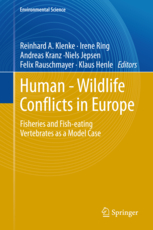Coordination: Prof. Dr. Klaus Henle , Prof. Dr. Irene Ring
Staff responsible: Prof. Dr. Klaus Henle , Prof. Dr. Irene Ring, Dr. Reinhard Klenke, Dr. Carsten Neßhöver, Dr. Bernd Gruber, Dr. Heidi Wittmer, Dr. Felix Rauschmayer, Dipl. Econ. Oliver Zwirner, Dr. Kathleen Schwerdtner Máñez, Dipl. Soc.Sc.Vivien Weiss, Dr. Randi Habighorst
Funded by: Fifth Framework Programme (FP5),
(SPF Code: EVK 2-CT-2002-00142-FRAP)
Project management: Dr. Reinhard Klenke, Dr. Carsten Neßhöver, Dipl. Econ. Oliver Zwirner
Project duration: 01.02. 2003 - 30.04. 2006
Participants: 13 partners in 9 countries
Motivation & Description
FRAP has one overall goal: the development of a generic Framework for Reconciliation Action Plans between the conservation of large vertebrates and the use of biological resources by humans. The generic framework will be illustrated using conflicts between the conservation of large fish-eating vertebrates and fisheries as models.The specific objectives are:
- to assess the conflicts between the conservation of fish-eating vertebrates and fisheries from an ecological and socio-economic perspective;
- to evaluate and develop successful mitigation strategies and a mix of policy instruments;
- to design participatory decision strategies and to develop recommendations for effective stakeholder interactions;
- to disseminate the results to stakeholders and the public.
FRAP has developed a generic Framework for biodiversity Reconciliation Action Plans consistent across national boundaries. This framework will be illustrated with examples from the conflicts between the conservation of seals, otter, respectively cormorants and fisheries. We have evaluated existing information and studied the conflicts for regions that either differ in the ecological basis of the conflict or in the use of socio-economic mitigation strategies. The regional comparisons are Denmark versus Italy for cormorants, Central Europe versus Portugal for otters, and Finland versus Sweden for gray seals. The executive summary gives a short overview about objectives, scientific achievements, main deliverables, socio-economic relevance and policy implications, conclusions and dissemination of results.
FRAP was organised in eleven workpackages (WPs) and three phases: more details
13 partners fom 9 countries participated in the project: more details
The results of FRAP were published in various forms: more details
and
presented at an international conference on
Management of conflicts between wildlife and human resource use
25 - 27 January 2006
in Leipzig.
please follow this link for more information
The project was finished at 30.06. 2006.
Main outcome of the project is the book
Human - Wildlife Conflicts in Europe: Fisheries and Fish-eating Vertebrates as a Model Case
Selected Publications
Jepsen, N., Klenke, R., Sonnesen, P. & Bregnballe,
Th. (2010): The use of coded wire tags to estimate
cormorant predation on fish stocks in an estuary. - Marine &
Freshwater Research. 61, 320-329
http://www.publish.csiro.au/paper/MF09038.htm
Gruber, B., Reineking, B., Calabrese, J.M., Kranz, A., Poledniková, K., Polednik, L., Klenke, R., Valentin, A. & Henle, K. (2008): A new method of estimating visitation rates of cryptic animals via repeated sign surveys. Journal of Applied Ecology 45, H. 2, 728-735. (doi: 10.1111/j.1365-2664.2007.01406.x )
Lampa S., Gruber B., Henle K. & Hoehn M. (2008) An optimisation approach to increase DNA amplification success of otter faeces. Conservation Genetics 9, 201-210.
Klenke, R., Tschierschke, A., Gruber, B., Lampa, S., Hempel, U., Geissler, S., Helm, C., Hofmann, C., Kalbitz, J., Kaulfuss, J., Liu, Z. & Henle, K. (2008): Räumliche und zeitliche Aktivitätsmuster von Fischottern (Lutra lutra Linnaeus, 1758) anhand von frischen Markierungsfunden in einer Teichlandschaft. Säugetierkdl. Inf. 6 (37): 229-246
Ring, I., Henle, K., Klenke, R., Neßhöver, C., & Arnhold, T. (2008): What to do when nature conservation is successful and humans face competition again? Journal of International Wildlife Law and Policy 11(2-3): 207-210. (doi: 10.1080/13880290802470307 )
Ring, I., Klenke, R., & Hufe, S. (2006): Schwierige
Fragen
richtig entscheiden: Die Konkurrenz um den Fisch. - UFZ Magazin,
84-85.
download




